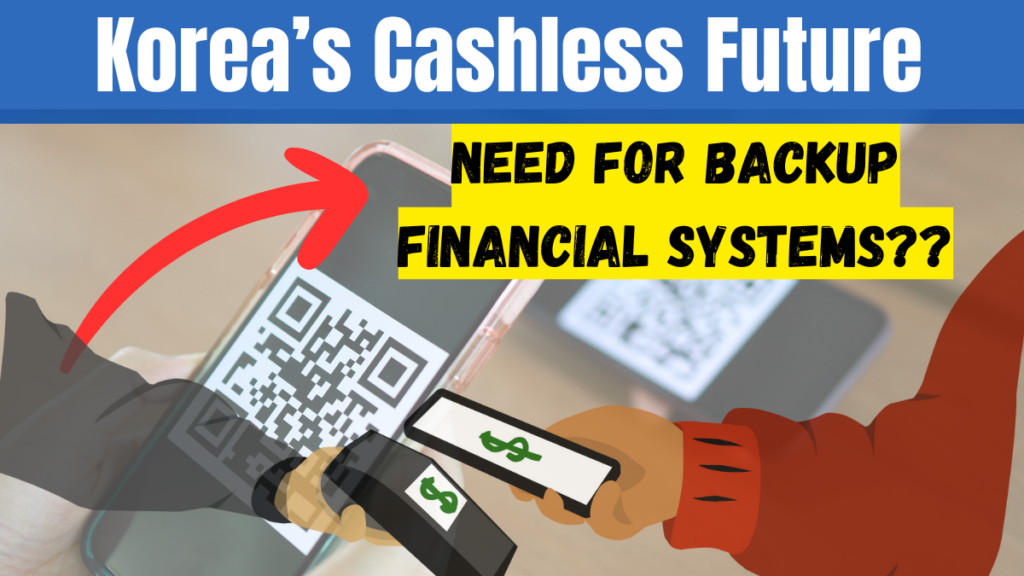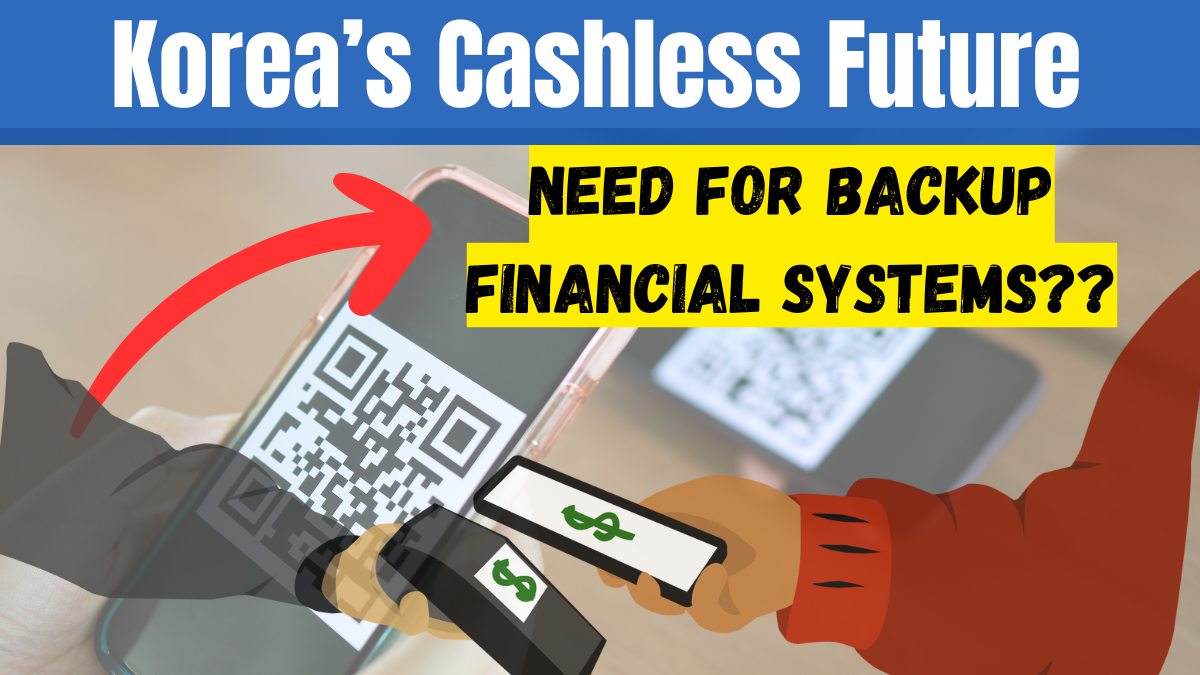Korea is rapidly transitioning into a cashless society, with digital payments replacing traditional cash transactions. While this shift enhances convenience and efficiency, concerns are growing over financial security risks, system failures, and cyber threats.
Foreign tourists, businesses, and financial experts are raising alarms about the downsides of a digital-only economy, urging authorities to ensure that cash remains a backup option in emergencies.

How Fast Is Korea Abandoning Cash?
According to the Bank of Korea, the share of cash payments in households has plummeted:
| Year | Cash Payments Share | Credit & Debit Card Payments Share |
|---|---|---|
| 2015 | 38.8% | 37.4% |
| 2018 | 32.1% | 52.0% |
| 2021 | 21.6% | 58.3% |
The number of ATMs in Korea has also significantly declined, with commercial banks reducing their cash withdrawal services:
| Year | Total ATMs in Korea |
|---|---|
| 2019 | 36,146 |
| 2024 | 27,076 |
Additionally, since the Seoul Metropolitan Government went cashless for buses in 2021, other regions have followed suit, making cash payments increasingly obsolete in public transportation.
How Is Korea’s Cashless System Affecting Tourists?
Foreign visitors in Korea are finding it difficult to use cash, especially when arriving from countries like Japan, where cash is still widely preferred.
According to Bae Young-sook, a receptionist at a tourist information center in Seoul, many travelers struggle to pay for:
- Bus and subway rides (which are now digital-only).
- Franchise cafes and convenience stores that only accept card payments.
- Taxis and retail stores that discourage cash transactions.
This contrast between Korea and Japan confuses tourists, especially since Japan keeps cash widely available for emergency preparedness in disasters like earthquakes.
Are Korea’s Digital Payment Systems Secure Enough?
Financial experts argue that Korea’s rapid shift to a cashless society requires stronger digital security measures to prevent nationwide system failures.
Major Digital Payment Disruptions in Korea:
-
KT Telecom Outage (2021)
- A nationwide service disruption shut down internet, phone calls, and electronic payments for hours, affecting millions.
-
SK C&C Data Center Fire (2022)
- A fire caused a major KakaoTalk service failure, disrupting mobile payments and affiliated services nationwide.
According to Jung Ho-chul of the Citizens’ Coalition for Economic Justice, these failures were caused by human errors but natural disasters or cyberattacks could result in even worse disruptions.
Are Cyberattacks a Threat to Korea’s Cashless Economy?
As Korea becomes more dependent on digital payments, experts warn that cyberattacks pose a growing financial security risk.
North Korean hackers have been actively targeting financial institutions and cryptocurrency exchanges, using stolen digital funds to support their regime.
If a coordinated cyberattack were to target Korea’s banking networks and payment systems, the country could face:
- Nationwide transaction failures.
- Massive financial data breaches.
- Severe economic disruptions.
Should Korea Keep Cash as a Backup Financial Option?
To prevent economic paralysis in case of digital failures, experts recommend that Korea:
- Maintain cash circulation as a backup payment method.
- Strengthen cybersecurity for banking and mobile transactions.
- Improve disaster-preparedness financial systems, similar to Japan’s approach.
Jung suggested that the government should ensure cash remains usable in emergencies, particularly in cases of cyberattacks, power outages, and natural disasters.
Key Takeaways
- Cash usage in Korea is declining rapidly, with ATMs disappearing and public transport going fully cashless.
- Foreign tourists struggle due to Korea’s digital-only payment system.
- System failures in 2021 and 2022 exposed vulnerabilities in Korea’s cashless infrastructure.
- Cyberattacks from North Korea pose a serious financial threat to digital payment security.
- Experts urge keeping cash as a backup for security and emergency situations.
FAQs About Korea’s Cashless Society
How much has cash usage declined in Korea?
Cash payments dropped from 38.8% in 2015 to 21.6% in 2021, while credit and debit card transactions have surged.
Why are foreign tourists struggling in Korea’s cashless system?
Many buses, retail stores, and cafes no longer accept cash, making it difficult for tourists to make payments, especially those arriving from cash-heavy countries like Japan.
What are the risks of a fully cashless economy?
The biggest concerns include:
- Cyberattacks on digital banking systems.
- Nationwide transaction failures due to system outages.
- No financial backup in natural disasters or emergencies.
Has Korea experienced major digital payment failures?
Yes. In 2021, KT Telecom suffered an outage, disrupting transactions, and in 2022, an SK C&C fire caused KakaoPay failures, affecting millions.
How does North Korea pose a cybersecurity threat to Korea’s digital economy?
North Korean hackers have stolen digital assets and attacked financial institutions, posing a serious risk to Korea’s cashless economy.
What can Korea do to prevent financial system failures?
- Strengthen cybersecurity for financial transactions.
- Ensure cash remains available as a backup.
- Implement disaster-proof banking systems, similar to Japan.
Does Korea still have ATMs?
Yes, but the number of ATMs has decreased significantly, from 36,146 in 2019 to 27,076 in 2024.
Should Korea keep cash as a backup option?
Experts believe cash should still be available for emergencies, security concerns, and financial system failures.
Click here to know more.
Aanchal is a passionate writer with a keen interest in storytelling, content creation, and creative expression. She enjoys exploring diverse topics and crafting engaging narratives that captivate readers.

